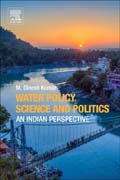
Water Policy Science and Politics: An Indian Perspective presents the importance of politics and science within policy making in the water sector. Many countries around the developed and developing world, including India, are experiencing major water scarcity problems which will undoubtedly increase with the impacts of climate change. In response to this challenge, there is increased focus worldwide on the development of more sustainable and integrated water resources policies; however, scientists and politicians are not working together, which creates challenges. This book addresses the challenges regarding the analysis and interpretation of data that has formed the basis for key reforms, policy changes and projects in the interrelated sectors of water, agriculture, energy and environment. Within Water Policy Science and Politics: An Indian Perspective, each chapter discusses a specific topic or theme in India's water, agriculture or energy sector, with a focus on the scientific aspects, the academic and political discourse and policy issues. The author presents several cases from the inter-related sectors of water resources, water supplies, sanitation, energy and climate, including some of the most controversial ones, to illustrate and discuss how science and politics can work together for a much better outcome. Challenges the linear and conventional approaches to water management and water policy making in India, which are applicable in developing countries across South Asia and Sub-Saharan Africa)Presents best practice ideas and methods to be implemented when science and politics must work together, which will also be applicable to global locations where this collaboration occursHighlights a key gap of communication between science and policy in water research, with solutions as to how this can be addressed INDICE: 1. Assessing the Importance of Water Infrastructure and Institutions for Water Security 2. Why India Needs Large Water Resource Projects Involving Inter-basin Water Transfers 3. Recent Droughts in India: Nature's Fury or Poor Statecraft? 4. A Critique of Mihir Shah Committee (2016) Report on Water Reforms in India 5. Does Hard Evidence Matter in Policy Making? The Case of Climate Change and Changing Land Use 6. Mission Kakatiya for Rejuvenating Tanks in Telangana: Making it a Mission Possible 7. Irrigation Miracle in Madhya Pradesh: What has worked? 8. Thanking 'Rainwater Harvesting' and Blaming the Rain God: The Case of Chennai Floods 9. Adapting to Climate Variability and Reducing Carbon Emissions: Strategies that Work for India 10. Canal Irrigation vs Well Irrigation: Comparing the Un-comparable 11. Green Revolution vs 'Dream Revolution': Agricultural Growth and Poverty Reduction in Eastern India 12. Deciding the Types of Interventions for Agricultural Development in different agro ecologies 13. Impacts of Micro Irrigation Systems: Perception vs Reality 14. Implications of Rising Demand for Dairy Products on Agricultural Water Use in India 15. How Do We Promote Adoption of Improved Latrines in India? Findings of a Study from Rural Andhra Pradesh
- ISBN: 978-0-12-814903-4
- Editorial: Elsevier Science
- Encuadernacion: Rústica
- Páginas: 300
- Fecha Publicación: 01/03/2018
- Nº Volúmenes: 1
- Idioma: Inglés
